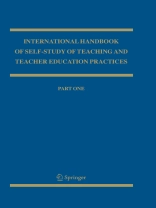The International Handbook on Self-study of Teaching and Teacher Education Practices is of interest to teacher educators, teacher researchers and practitioner researchers. This volume: -offers an encyclopaedic review of the field of self-study; -examines in detail self-study in a range of teaching and teacher education contexts; -outlines a full understanding of the nature and development of self-study; -explores the development of a professional knowledge base for teaching through self-study; -purposefully represents self-study through research and practice; -illustrates examples of self-study in teaching and teacher education.
قائمة المحتويات
Understanding the Nature and Development of Self-Study.- A History and Context of Self-Study of Teaching and Teacher Education Practices.- The Nature of Teaching and Learning in Self-Study*.- Self-Study As Teaching.- Finding A Way Through The Swamp: A Case For Self-Study As Research*.- Learning Through Self-Study: The Influence Of Purpose, Participants And Context*.- Fundamental Features and Approaches of The S-Step Enterprise*.- Voice in Self-Study*.- Self-Study In Professional Practice*.- Thinking about the Thinking about Self-Study: An Analysis of Eight Chapters.- Developing a Professional Knowledge Base for Teaching.- Professional Knowledge, Teacher Education and Self-Study*.- Links between Self-Study and Teacher Education Reform*.- Research, Practice, and Academia in North America*.- Humanistic Research in Self-Study: A History of Transformation*.- The Significance of Race and Social Class for Self-Study and The Professional Knowledge Base of Teacher Education$*$.- Knowledge, Narrative And Self-Study.- Practitioner Inquiry, Knowledge, and University Culture*.- Knowledge, Social Justice and Self-Study*.- Examples of Practice: Professional Knowledge and Self-Study in Multicultural Teacher Education.- Revisioning And Recreating Practice: Collaboration In Self-Study*.- The Dialectics of Passion and Theory: Exploring The Relation Between Self-Study and Emotion*.- Representing Self-Study in Research and Practice.- The Methodology of Self-Study and Its Theoretical Underpinnings.- What Counts as Evidence in Self-Studies of Teacher Education Practices.- Self-Study Through Personal History.- Self-Study Through Action Research.- Visual Artistic Modes of Representation for Self-Study.- Using Information and Communication Technologies for the Self-Study of Teaching.- The Reflective Portfolio in Self-Study: Inquiring Into and Representing A Knowledge of Practice.- The Epistemological Dimensions and Dynamics of Professional Dialogue In Self-Study.- Afterword Moving The Methodology of Self-Study Research and Practice Forward: Challenges and Opportunities.- Self-Study in Teaching and Teacher Education.- Tracing the Development of Self-Study in Teacher Education Research and Practice.- Factors Important for the Scholarship of Self-Study of Teacher Education Practices.- Self-Study in School Teaching: Teachers’ Perspectives.- The Preservice Practicum: Learning Through Self-Study In A Professional Setting.- Self Study in Teaching About Teaching.- Self-Study Research in the Context of Teacher Education Programs.- Administrators also do Self-Study: Issues of Power and Community, Social Justice and Teacher Education Reform.- Identifying Ethical Issues in Self-Study Proposals.- Interpreting The What, Why and How of Self-Study In Teaching And Teacher Education.












